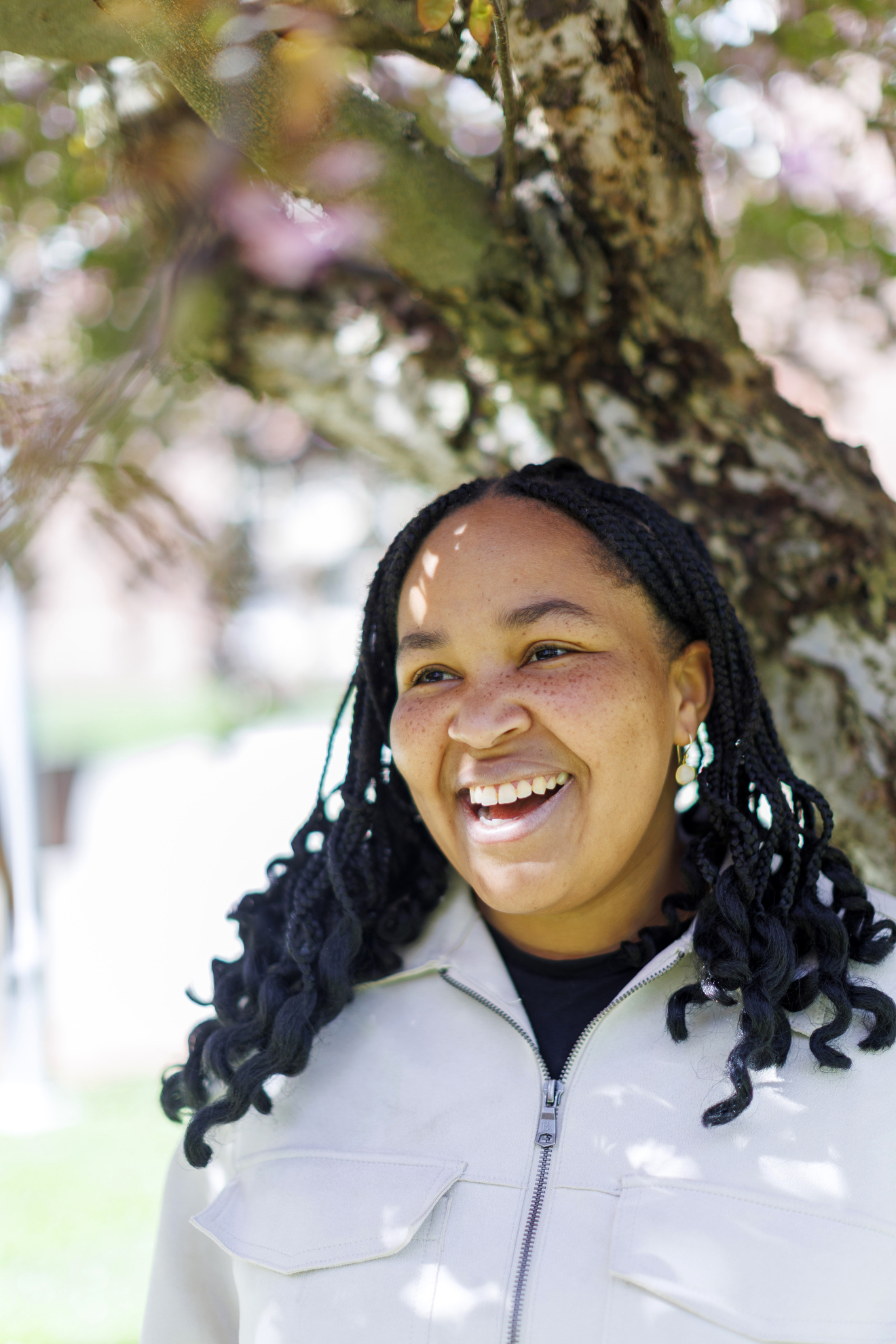‘It’s the best feeling, helping a prosecutor, a judge, see someone’s humanity’
At Law School, Sophia Hunt discovers passion for defense — and rises to job once held by Obama

Stephanie Mitchell/Harvard Staff Photographer
Part of the Commencement 2025 series
A collection of features and profiles covering Harvard University’s 374th Commencement.
When Sophia Hunt found out she had been elected president of the Harvard Law Review in February 2024, she texted her family group chat: “What do Barack Obama and I have in common?”
That commonality of course, was being selected by their peers to lead the nearly 140-year-old student publication that has been influential in shaping American law throughout its history.
“The works that we publish can be read by justices, lawyers, professors, and students and can not only shape the law itself but also shape our orientation about what the law can and should be,” she said.
After she graduates with her Juris Doctorate, Hunt plans to enter the world of criminal defense. Once she passes the bar, that is. Her interest, Hunt said, stems from working for the Office of the Federal Public Defender after her first year of Law School.
“That was a really formative experience,” she said. “It was really nice to be able to put legal research and writing to practice.”
Hunt joined Harvard Defenders, a student practice that provides pro bono representation to low-income defendants in criminal show-cause hearings and assists clients looking to seal their records, among other legal issues.
Hunt also took part in the Tenant Advocacy Project at HLS helping represent clients facing issues such as revocation of Section 8 housing vouchers. She also provided representation and legal research assistance to incarcerated people through the Prison Legal Assistance Project.
In her last year at the Law School, she worked with Harvard’s Criminal Justice Institute.
“That was like being a baby public defender, where I visited clients in jail and stood up in court and wrote motions,” she said. “Sometimes it was just talking and listening to someone’s story and being the first person to hear them. That has been incredibly fulfilling.”
“I just find so much meaning in working and advocating on behalf of individual clients.”
Hunt graduated from Harvard College in 2019 with a bachelor’s degree in history and literature. From there she headed off to Stanford to pursue a Ph.D. in sociology.
But after three years of research and writing at the intersection of law and society and receiving her master’s, she felt a call to law school and took a leave of absence from her Ph.D. program.
“In the back of my head, I’ve thought — is being a lawyer the best way to help the individuals and communities that I care about? Should I be doing more policy-related work, or should I be thinking about academia and putting new ideas out there and trying to change the law from that standpoint?” she said.
“I just find so much meaning in working and advocating on behalf of individual clients,” she added. “It’s the best feeling, getting to tell their stories, and helping a prosecutor, a judge, see someone’s humanity.”
In addition to her course load and participation in groups that brought her into the courtroom, Hunt said she joined Harvard Law Review in her second year at HLS to “further invest” herself in the Law School community and flex her academic muscles.
Hunt went on to be elected by that community to lead the Law Review as its second-ever Black woman president, after ImeIme Umana, who was elected in 2017.
“Just being in the same sentence as her is a complete privilege,” Hunt said. “It was an honor to be in consideration of all these amazing former presidents, including ones who were Black. But for me, I hope that we’re past the hump of having first and seconds. I hope it’s become more normalized at this point — someone being elected because they’re perceived as being the best person for the job.”
Reflecting on her time in the top spot, Hunt said it was challenging and rewarding but overall not as much an exercise in shaping the voice of the Review as an exercise in management.
“When it comes to editorial decisions, what’s really helpful is that our entire body is involved in the articles that we publish,” she said. “I tried to reflect the body’s will and interest in carrying out those decisions. And getting to work so closely on so many brilliant pieces was just phenomenal.”
Maureen Brady, Louis D. Brandeis Professor of Law at Harvard Law School, said Hunt’s leadership skills should serve her well during challenging times.
“It’s an incredibly important moment in our world,” said Brady, who teaches property law and related subjects. “There’s so much conflict, and there’s incredible polarization. I think law school is about learning a common language that we can use to argue about things and to deeply disagree, but also to, hopefully, reach justice. Sophia is someone who really embodies that, who has led a wide range of people, and who has pursued a really interesting path here, toward justice.”
After she passes the bar, Hunt plans to clerk for a judge in Mississippi.
“Through law school, you read a bunch of judicial opinions and now to switch over and help in the crafting of judicial opinions … it’s going to be interesting to see things on the other side.”
She added: “I’m excited to eat well and meet a bunch of new people, and I think I have to get into college football.”




